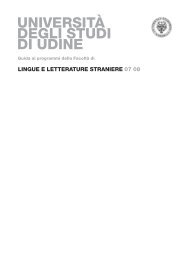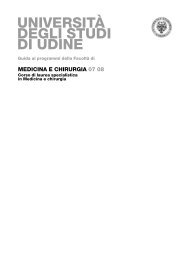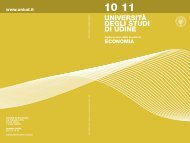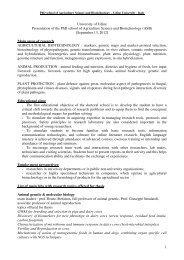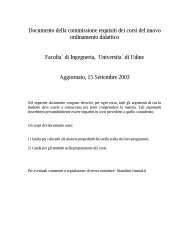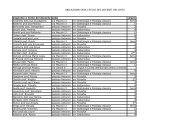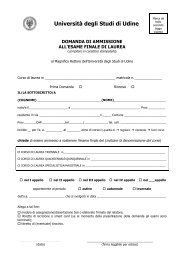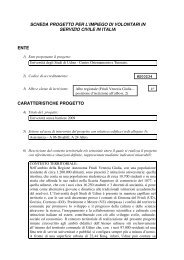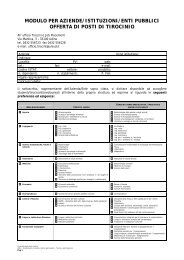â¢GUIDA ECONOMIA 07-08 - Università degli studi di Udine
â¢GUIDA ECONOMIA 07-08 - Università degli studi di Udine
â¢GUIDA ECONOMIA 07-08 - Università degli studi di Udine
You also want an ePaper? Increase the reach of your titles
YUMPU automatically turns print PDFs into web optimized ePapers that Google loves.
214 prospectus u<strong>di</strong>ne<br />
ics, Ad<strong>di</strong>son-Wesley, Boston, 2005.<br />
- P. DE GRAUWE, Economia dell’Unione<br />
Monetaria, Il Mulino, Bologna, 2004.<br />
MACROECONOMICS<br />
ADVANCED COURSE 1<br />
Prof.ssa Marji Lines<br />
Aims<br />
The course in Advanced Macroeconomics<br />
(in 2 parts) considers the areas of<br />
research (economic growth, business<br />
cycles, technological progress, etc.) and<br />
general approaches (both descriptive and<br />
optimizing models) of modern macroeconomic<br />
theory.<br />
Contents<br />
Part 1 of Advanced Macroeconomics<br />
introduces the student to the modern theory<br />
of economic growth as formalized in<br />
descriptive models of the basic relations<br />
between macroeconomic variables (e.g.,<br />
the Solow-Swann model), and in microfounded<br />
models for which macroeconomic<br />
variables are derived from the optimal<br />
decisions of a single representative<br />
agent (e.g. the optimal growth model of<br />
Ramsey-Cass-Koopmans and the overlapping<br />
generations model of Samuelson-<br />
Diamond). Such current debates as<br />
regards pension schemes and the origins<br />
of growth in market economies are <strong>di</strong>scussed<br />
in the context of these models.<br />
Bibliography<br />
- D. ROMER, Advanced Macroeconomics,<br />
McGraw-Hill, 2005.<br />
Other rea<strong>di</strong>ng<br />
- M. BURDA, C. WYPLOSZ, Macroeconomics:<br />
a European Text, Oxford Univ. Press,<br />
2001.<br />
- R.J. BARRO, X. SALA-Y-MARTIN, Economic<br />
Growth, McGraw-Hill, 1995.<br />
Exam<br />
Three quizzes and a written final.<br />
MACROECONOMICS<br />
ADVANCED COURSE 2<br />
Prof.ssa Marji Lines<br />
Aims<br />
The course in Advanced Macroeconomics<br />
(in 2 parts) considers the areas of<br />
research (economic growth, business<br />
cycles, technological progress, etc.) and<br />
general approaches (both descriptive and<br />
optimizing models) of modern macroeconomic<br />
theory.<br />
Contents<br />
Part 2 of Advanced Macroeconomics<br />
applies the macroeconomic concepts,<br />
hypotheses, and mechanisms introduced<br />
in Part 1 to the study of business cycle theory<br />
and economic development. The first<br />
model of economic fluctuations mo<strong>di</strong>fies<br />
Samuelson’s multiplier-accelerator<br />
scheme by introducing a hypothesis of<br />
heterogeneous expectations. The second<br />
introduces a hypothesis of rational expectations<br />
into Ramsey’s microfounded optimal<br />
growth model. The current debate on<br />
the origins of fluctuations in market<br />
economies is <strong>di</strong>scussed in the context of<br />
these models. Finally, macroeconomic<br />
theory is applied to the problem of economic<br />
development in the modern setting<br />
of a global market economy.<br />
Bibliography<br />
- D. ROMER, Advanced Macroeconomics,<br />
McGraw-Hill, 2005.<br />
Other rea<strong>di</strong>ng<br />
- P. MINFORD, D. PEEL, Advanced Macroeconomics,<br />
Edward Elgar, 2002.<br />
- M. LINES, F. WESTERHOFF, in PUU,<br />
SUSHKO (eds.), Business Cycle Dynamics,<br />
Springer-Verlag, 2006.<br />
- J. SACHS, The End of Poverty, Penguin,<br />
2005.<br />
Exam<br />
A written exam on business cycle theory<br />
and a project on economic development.



